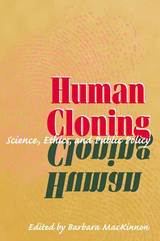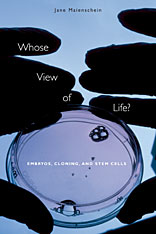
Discussions and debates over the medical use of stem cells and cloning have always had a religious component. But there are many different religious voices. This anthology on how religious perspectives can inform the difficult issues of stem cell research and human cloning is essential to the discussion. Contributors reflect the spectrum of Christian responses, from liberal Protestant to evangelical to Roman Catholic. The noted moral philosopher, Laurie Zoloth, offers a Jewish approach to cloning, and Sondra Wheeler contributes her perspective on both Jewish and Christian understandings of embryonic stem cell research.
In addition to the discussions found here, God and the Embryo includes a series of official statements on stem cell research and cloning from religious bodies, including the Roman Catholic Church, the Orthodox Church in America, the United Methodist Church, the Southern Baptist Convention, the United Church of Christ, the Presbyterian Church (USA), and the Union of Orthodox Jewish Congregations of America and the Rabbinical Council of America. "Human Cloning and Human Dignity: An Ethical Inquiry," from the statement of the President's Council on Bioethics, concludes the book.
The debates and the discussions will continue, but for anyone interested in the nuances of religious perspectives that make their important contributions to these ethically challenging and important dialectics, God and the Embryo is an invaluable resource.

In this concise volume, experts on all sides of the debate make arguments for why we should either pursue, regulate, or ban the cloning of human beings. From this collection, readers will gain a clearer picture of the history of cloning in agriculture and animal science, the various biological procedures that are encompassed by the term "cloning," the philosophical arguments in support of and opposed to cloning humans, and the considerations that should inform discussions about public policy matters related both the cloning research and to human cloning itself.
Balancing scientific detail with philosophical argument, Human Cloning succinctly outlines what cloning is and is not (e.g., cloning does not produce identical individuals), what has led to recent scientific developments, what is now possible, and what ethical dilemmas cloning presents. Opponents claim that cloning subverts human dignity, makes a mockery of spousal love, and poses serious safety hazards. Proponents cite a range of potential benefits, such as producing transplant tissue that is less likely to be rejected, extending current techniques of artificial insemination, and controlling genetic abnormalities to prevent birth defects.
Cloning itself is not new, but as the science of cloning continues to advance--and as human cloning thus inches closer to reality--we are compelled to consider its implications for society. Human Cloning is a lucid, substantive guide to this contentious and potentially revolutionary issue.

Contributors come from a range of backgrounds and explore the digital innovations and technical interactions between human and machine that allow the show to challenge conventional notions of performance and identity, address family themes, and Orphan Black’s own textual genealogy within the contexts of science, reproductive technology, and the politics of gender, and extend their inquiry to the broader question of community in a "posthuman" world of biopolitical power. Mobilizing philosophy, history of science, and literary theory, scholars analyze the ways in which Orphan Black depicts resistance to the many forms of power that attempt to capture, monitor, and shape life today.

Saving lives versus taking lives: These are the stark terms in which the public regards human embryo research--a battleground of extremes, a war between science and ethics. Such a simplistic dichotomy, encouraged by vociferous opponents of abortion and proponents of medical research, is precisely what Jane Maienschein seeks to counter with this book. Whose View of Life? brings the current debates into sharper focus by examining developments in stem cell research, cloning, and embryology in historical and philosophical context and by exploring legal, social, and ethical issues at the heart of what has become a political controversy.
Drawing on her experience as a researcher, teacher, and congressional fellow, Jane Maienschein provides historical and contemporary analysis to aid understanding of the scientific and social forces that got us where we are today. For example, she explains the long-established traditions behind conflicting views of how life begins--at conception or gradually, in the course of development. She prepares us to engage a major question of our day: How are we, as a 21st-century democratic society, to navigate a course that is at the same time respectful of the range of competing views of life, built on the strongest possible basis of scientific knowledge, and still able to respond to the momentous opportunities and challenges presented to us by modern biology? Maienschein's multidisciplinary perspective will provide a starting point for further attempts to answer this question.
READERS
Browse our collection.
PUBLISHERS
See BiblioVault's publisher services.
STUDENT SERVICES
Files for college accessibility offices.
UChicago Accessibility Resources
home | accessibility | search | about | contact us
BiblioVault ® 2001 - 2024
The University of Chicago Press









